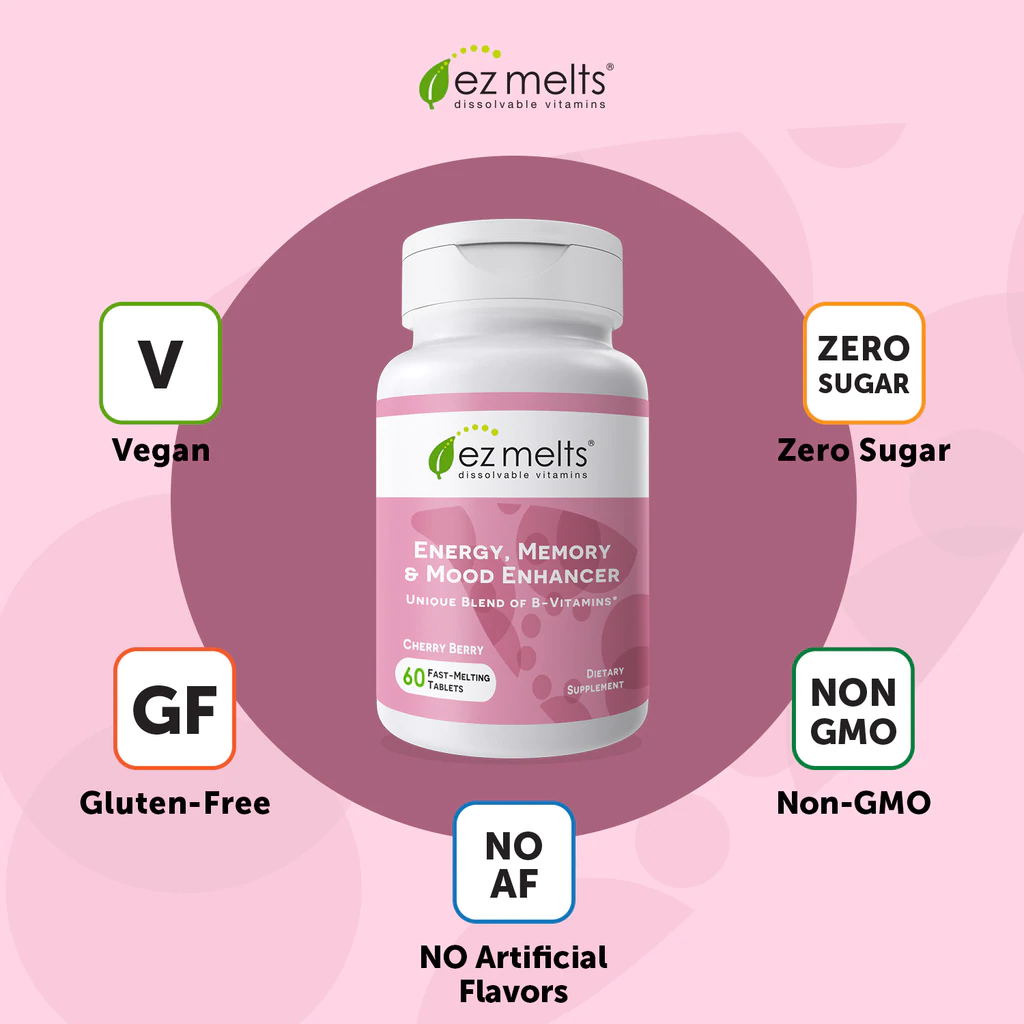Feeling drained and low on focus? The truth is, most vitamins for energy only help if you’re deficient in something essential. But that’s also where the real power lies, identifying and addressing what your body is missing.
Below, we’ll break down the key nutrients that actually make a difference, highlight one of the most innovative supplement formats on the market, and help you choose wisely.
This article walks you through:
- The biochemistry of energy (so you understand “why vitamins matter”)
- Which vitamins/minerals have strong human evidence for easing fatigue
- How to choose, dose, and combine supplements safely
- A spotlight on a practical, well-formulated product (EZ Melts) you can try
- A realistic timeline and caveats
Let’s dig in.
The biochemistry of energy — why micronutrients matter
At the cellular level, energy comes from ATP (adenosine triphosphate), generated via metabolic pathways including glycolysis, the citric acid (Krebs) cycle, and oxidative phosphorylation. Many enzymes in those pathways require cofactors, often vitamins or minerals.
B vitamins (B1, B2, B3, B5, B6, B8, B9, B12), vitamin C, iron, magnesium, and zinc are intimately involved in converting food into energy, supporting redox balance, DNA repair, and neurological function. PMC
In simple terms: if those cofactor nutrients are low, the “machinery” has trouble running at full speed, and you feel sluggish.
But a caveat: just because something can aid energy doesn’t mean giving mega-doses will supercharge you if your baseline is already adequate. Many studies find benefit only in deficiency states or clinical fatigue contexts. WebMD+1
Which vitamins & supplements have solid clinical support?

Let’s walk through the ones worth knowing (the “serious contenders”), with their supporting evidence, limitations, and best-use tactics.
1. B Vitamins (especially B12, folate, B6)
Why they help: B vitamins are central to coenzyme forms (e.g., FAD, NAD) that shuttle electrons, carry acyl groups, and support mitochondrial function. PubMed
Evidence & limitations:
- In those with B12 deficiency, supplementation reliably restores energy, resolves anemia, and improves fatigue.
- But studies show that if B12 levels are normal, extra B12 does not reliably increase energy.
- High-dose B6 (pyridoxine) has risks (e.g. neuropathy) beyond safe thresholds.
Best practice: Get a B12 + folate + full B-complex panel if you suspect deficiency (e.g. vegan diet, GI issues, metformin users). If low, correct with the right form (methylated B12 or folate as needed). Don’t megadose blindly.
2. Vitamin D
Why it helps: Vitamin D receptors appear in muscle, brain, immune cells, and other energy-related tissues. Low vitamin D links to generalized fatigue in observational studies. ScienceDirect+2Houston Methodist+2
Evidence & limitations:
- A meta-analysis suggests vitamin D treatment significantly improved fatigue in people deficient in D.
- But randomized trials are fewer, and some positive results may reflect correction of deficiency rather than “boosting” above normal.
Best practice: Check serum 25-hydroxyvitamin D. If low (<20–30 ng/mL, depending on lab), supplement under physician guidance. Avoid going far above upper limits without monitoring.
3. Iron (Ferritin / Hemoglobin)
Why it helps: Iron is central to hemoglobin (oxygen delivery) and mitochondrial enzymes for energy production. Low iron (or low ferritin) is one of the most common reversible causes of fatigue, especially in menstruating people or those with GI losses.
Evidence & limitations:
- Several clinical reviews emphasize that raising ferritin from low to mid-range often alleviates fatigue and exercise intolerance.
- But excess iron is harmful (oxidative stress, organ damage). Supplementation must be targeted and monitored.
Best practice: Test ferritin, iron, TIBC, CBC before supplementing. If ferritin is low (thresholds vary by practitioner, often ~40–70 ng/mL), use elemental iron plus vitamin C. Re-evaluate after 8–12 weeks.
4. Magnesium & Zinc
These are “supportive players,” not the star of many fatigue trials, but often the missing pieces in borderline cases.
- Magnesium is involved in ATP stabilization and hundreds of enzymatic reactions. Deficiency can present with weakness, cramps, irritability. Some observational and small trials link low Mg with fatigue.
- Zinc is required for DNA repair, immune function, and mitochondrial enzymes. Low zinc correlates with fatigue in some settings. PMC
These are best considered adjunctive—useful when dietary intake is poor or lab values suggest low status.
5. Coenzyme Q10 (CoQ10)
This is one of the more interesting non-vitamin compounds in the energy/fatigue space.
What it is: A lipid-soluble molecule in mitochondrial membranes that shuttles electrons and acts as an antioxidant. Levels decline with age, statin use, and chronic disease. Mayo Clinic+2Linus Pauling Institute+2
Evidence:
- A 2022 meta-analysis found that CoQ10 supplementation significantly reduced fatigue scores in human RCTs vs placebo. PMC
- Clinical trials in chronic fatigue syndrome (CFS) populations using CoQ10 + NADH showed reduced fatigue impact compared to placebo over 8–12 weeks. PMC
- In trials combining CoQ10 with B vitamins and minerals, fatigue, sleep and subjective quality-of-life outcomes improved modestly in certain populations. PMC
- Animal or small human trials show oral CoQ10 improves subjective fatigue during induced physical stress or performance tests. ResearchGate
Limitations & cautions:
- Effects tend to be modest-to-moderate; not everyone responds
- Cost tends to be high
- Some formulations absorb better (e.g. ubiquinol)
- Interaction caution: anticoagulants, chemotherapy, etc.
Best practice: Try a moderate dose (e.g. 100–300 mg daily) for 8–12 weeks if deficient or in chronic fatigue contexts, with medical oversight.
6. Adaptogens & Plant-based Compounds (Ashwagandha, Ginseng, etc.)
These aren’t vitamins, but they deserve mention since many people try them for energy.
- Ashwagandha: Some human trials and narrative reviews suggest reduced fatigue, improved vigor, particularly in stress or burnout contexts.
- Ginseng: Mixed evidence; potential benefit in chronic disease or fatigue settings, but side effects and interactions (BP, bleeding) warrant caution.
These are best used in adjunct, not as primary energy boosters unless clear evidence supports them for your condition.
Risk, synergy, and real-world context
- You need to test rather than guess. Start with labs (B12, folate, D, ferritin, magnesium, etc.).
- Combination matters. Some nutrients compete (iron & zinc), others synergize (iron + vitamin C).
- Don’t neglect lifestyle. Sleep, stress, calorie balance, hydration, and movement are foundational (supplements support, not replace).
- Duration & re-evaluation. Use a nutrient consistently for 8–12 weeks then retest labs and symptom response.
- Watch for interactions. Especially if you take medications (statins, anticoagulants, thyroid, hormones).
- Not all fatigue is nutritional. Underlying conditions (thyroid, adrenal, infections, sleep apnea) must be ruled out.
Spotlight: EZ Melts Energy Memory & Mood Enhancer

Here’s a real-life, consumer-ready supplement that aligns reasonably with the science above:
- Product: EZ Melts Energy Memory & Mood Enhancer
- Format: Fast-melting, sugar-free, vegan tablet (no water needed)
- Core ingredients: Methylcobalamin (active B12), L-5-methylfolate (folate), other B-vitamins
- Intended benefits: Daily energy support, better memory/focus, mood balance
- Clean label features: Zero sugar, non-GMO, free of soy/gluten/dairy
This product is interesting because:
- It uses active vitamin forms (methylated B12 and folate) rather than basic cyanocobalamin/folic acid, which can matter for absorption in people with methylation differences.
- The fast-melt delivery may improve adherence (people skip supplements that they dislike swallowing).
- Its formula aligns with what science suggests works best: correcting B12/folate deficits in a clean, baseline-supporting scaffold.
If your fatigue is mild-to-moderate and your labs show low or borderline B12/folate, this type of supplement could be one practical choice (alongside the others we discussed). As always, start with labs and physician oversight.
Suggested usage roadmap (for someone wanting to try this scientifically)
- Baseline testing (with physician):
- B12, folate, methylation / homocysteine if available
- 25-hydroxy vitamin D
- Ferritin, iron, TIBC, CBC
- Magnesium, zinc
- Thyroid/adrenal/sleep/other relevant panels based on symptoms
- Address the biggest deficit first
- If B12 or folate is low, correct with an appropriate form and dose
- If vitamin D is low, replete to mid-range
- If ferritin is low, treat iron with caution
- Simultaneously adopt good habits
- Quality sleep, stress management, whole foods, hydration, gentle movement
- Avoid stimulants or crash cycles
- Trial a clean B-vitamin formula (like EZ Melts) for 8–12 weeks
- Track energy, focus, mood, side effects
- Consider combining with moderate CoQ10 (if fatigue persists)
- Re-test labs and assess benefit
- Stop non-beneficial supplements
- Adjust dose based on labs and tolerance
- Consider adaptogens or targeted extras only if deficits are corrected and residual fatigue persists
Realistic expectations & timeline
- Weeks 0–4: Cellular adaptation, nutrient loading, early subjective shifts
- Weeks 4–8: Noticeable changes in baseline energy, mental clarity
- Weeks 8–12: Consolidation; those who respond will show reliable changes
- Beyond 12 weeks: Reassess—some fatigue may stem from non-nutritional factors
Don’t expect an overnight “boost pill.” Sustainable energy gains come from systemic balance.
Summary & final thoughts
- Vitamins and minerals don’t “inject energy” like caffeine—they optimize the machinery to run efficiently.
- The most evidence-backed nutrients for fatigue are B12/folate (in deficiency), vitamin D (in deficiency), and iron (in low ferritin/anemia).
- CoQ10 offers moderate support in specific fatigue contexts, backed by meta-analyses and trials.
- Adaptogens (ashwagandha, ginseng) may help with stress-related fatigue, but expect modest effects and always check interactions.
- Always test first, dose smartly, and re-evaluate—supplementation is a tool, not a shortcut.





















